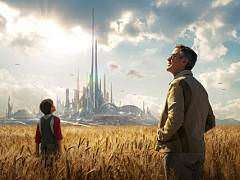Tomorrowland: 'Atlas Shrugged reimagined by Mickey Mouse'
Is director Brad Bird's film an "insidiously political" argument for the value of individual achievement?

Brad Bird's Tomorrowland is "the most insidiously political blockbuster ever made," writes Barry Hertz at Toronto's Globe and Mail. Like Ayn Rand, Hertz argues, director Bird "pines for worlds where incredible people can be free to do incredible things, and to hell with everyone else."
This is a theme that some of Bird's critics have been pursuing for years: The New York Times evoked Rand when it reviewed The Incredibles in 2004. The Guardian thought that film's message—"powerful people must not be held back by the mediocre masses," according to the paper—was more out of Nietzsche than Rand. As for critic Hertz, he believes that all of Bird's films have projected an "Objectivist message," one that has "allowed him to build an IMDb profile that would make Ayn Rand blush."
The Iron Giant (1999)? "On the surface, it's a charming cartoon about a boy and his alien robot. Yet the film spends an awful lot of time and energy developing a deep mistrust of government forces, especially military bureaucrats whose sole purpose is to destroy something they don't understand, something spectacular."
The Incredibles (2004)? "Here, an ungrateful (i.e. complacent, average, worthless) public bands together to force superbeings into a life of mediocrity, so terrified are they of anything powerful or special. The film's villain, who embraces envy as much as Rand rejected it, also has a half-cocked scheme to mass-produce superpowered weapons, laying out Bird's guiding philosophy in one tidy pull quote: 'When everyone's super, no one will be.'"
Ratatouille (2007)? That film "employed lush speeches on the importance of elitism and the dangers of complacency, albeit speeches delivered by a talking rat." Hertz could have done better than that: ex-reason staffer Julian Sanchez wrote in 2007 that "Ratatouille is essentially an animated version of The Fountainhead, except that cooking replaces architecture, Ellsworth Toohey eventually has a Grinchian change of heart, and Howard Roark is a rodent."
Hertz writes that Mission: Impossible—Ghost Protocol (2011) doesn't really count, since Bird didn't write the script. Still, he asks, "isn't Tom Cruise's superspy, Ethan Hunt, just an ass-kicking John Galt?"
As for the new film, Hertz characterizes it this way: "Tomorrowland was constructed by the world's 'best and brightest,' who were able to realize their visions only by being 'free from government, bureaucracy' and other forces of mediocrity that would quash the gifts of the exceptional."
Bird dismisses the Rand comparisons as "ridiculous" whenever he's asked. "I'm definitely a centrist and feel like both parties can be absurd." Hertz includes the denial in his essay, but he's not buying it. "One or two ideological slips are easy to brush off," he writes, "but with Tomorrowland, Bird has produced four unmistakably Objectivist tracts. There are coincidences, and then there's proselytizing.
Peter Suderman reviewed Tomorrowland here and Kurt Loder reviewed it here.


Show Comments (231)